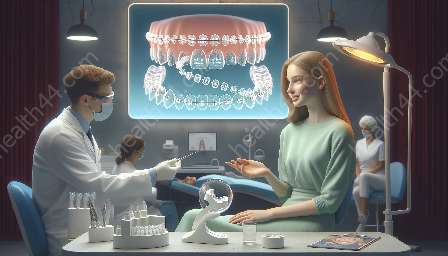Temporomandibular joint disorder (TMJ) is a condition that affects the jaw joint and muscles that control jaw movement. It is characterized by pain and discomfort in the jaw, face, and neck, and can impact overall health. This comprehensive guide explores the causes, symptoms, and treatment options for TMJ, and highlights the critical role of oral and dental care in managing TMJ symptoms and promoting better health.
What is TMJ?
The temporomandibular joint (TMJ) is the hinge joint that connects the lower jaw (mandible) to the temporal bone of the skull, which is located in front of each ear. This joint allows for essential movements, such as talking, chewing, and yawning. TMJ disorder refers to a group of conditions that cause pain and dysfunction in the jaw joint and the muscles that control jaw movement.
Causes of TMJ
The exact cause of TMJ disorder is often difficult to determine, as it can result from a combination of factors. Common contributors to TMJ disorder include:
- Bruxism (teeth grinding or clenching): Habitually grinding or clenching teeth can put excessive pressure on the temporomandibular joint, leading to TMJ disorder.
- Malocclusion (misaligned bite): An improper bite alignment can strain the jaw joint and muscles, contributing to TMJ symptoms.
- Arthritis: Degenerative joint diseases like osteoarthritis or rheumatoid arthritis can affect the TMJ and cause pain and dysfunction.
- Injury or trauma: Direct trauma to the jaw, head, or neck can damage the TMJ and surrounding tissues, leading to TMJ disorder.
- Stress: Chronic stress can manifest as jaw tension and clenching, exacerbating TMJ symptoms.
Symptoms of TMJ
TMJ disorder can present a wide range of symptoms, which may vary from person to person. Common signs and symptoms of TMJ disorder include:
- Jaw pain or tenderness
- Difficulty or discomfort when chewing
- Clicking, popping, or grating sounds in the jaw joint
- Locking of the jaw or limited mouth opening
- Facial pain or fatigue
- Earaches or ringing in the ears (tinnitus)
- Headaches or migraines
- Neck and shoulder pain
- Changes in bite alignment
It's essential for individuals experiencing any of these symptoms to seek professional evaluation and diagnosis.
Treatment Options for TMJ
Successful management of TMJ disorder often involves a multidisciplinary approach, combining various treatment modalities tailored to each individual's specific needs. Treatment options for TMJ disorder may include:
- Oral and Dental Care: Proper oral hygiene, regular dental check-ups, and addressing dental issues, such as malocclusion, can contribute to alleviating TMJ symptoms.
- Medications: Over-the-counter pain relievers, muscle relaxants, and anti-inflammatories may be prescribed to manage pain and inflammation associated with TMJ disorder.
- Physical Therapy: Exercises, stretches, and manual techniques can help improve jaw mobility and reduce muscle tension.
- Oral Appliances: Customized night guards or splints can help alleviate teeth clenching and grinding, reducing the strain on the TMJ.
- Stress Management: Stress-reducing techniques, such as relaxation exercises, counseling, or mindfulness practices, can help alleviate TMJ symptoms exacerbated by stress.
- Dietary Modifications: Soft diet, avoiding hard or chewy foods, and incorporating anti-inflammatory foods can ease jaw discomfort and promote healing.
- Injections: In some cases, corticosteroid injections or botulinum toxin (Botox) injections may be recommended to alleviate severe TMJ pain and muscle tension.
- Surgery: Surgical intervention is rarely considered and is usually reserved for severe, unresponsive cases of TMJ disorder.
Oral and Dental Care for TMJ
Effective oral and dental care is integral to managing TMJ symptoms and improving overall oral health. Individuals with TMJ disorder can benefit from the following oral and dental care practices:
- Maintain Good Oral Hygiene: Regular brushing, flossing, and rinsing with an antimicrobial mouthwash can help prevent dental issues that may worsen TMJ symptoms.
- Address Malocclusion: Consulting with a dentist or orthodontist to address bite alignment issues can help reduce strain on the TMJ and alleviate related symptoms.
- Custom Oral Appliances: Dentists can create custom night guards or splints to protect teeth from grinding and reduce pressure on the TMJ.
- Regular Dental Check-ups: Scheduling routine dental examinations allows for early detection and management of dental issues contributing to TMJ disorder.
- Orthodontic Treatment: In some cases, orthodontic interventions may be recommended to correct misaligned bites and reduce TMJ strain.
- Educational Support: Dentists can provide education on jaw exercises, stress management, and dietary modifications that can support TMJ management.
Impact of TMJ on Overall Health
TMJ disorder can have broader implications for overall health and well-being. Chronic pain and discomfort associated with TMJ can affect an individual's quality of life, leading to physical, emotional, and psychological challenges. Additionally, TMJ symptoms can contribute to poor sleep, heightened stress levels, and difficulties in maintaining a nutritious diet. By addressing TMJ through comprehensive oral and dental care, individuals can improve not only their oral health but also their overall well-being.
Conclusion
Temporomandibular joint disorder (TMJ) is a complex condition that requires a holistic approach to management. By understanding the causes, recognizing the symptoms, and exploring effective treatment options for TMJ, individuals can take proactive steps to improve their oral and overall health. Through the integration of oral and dental care practices, individuals can alleviate TMJ symptoms, enhance jaw functionality, and promote their general well-being.
































